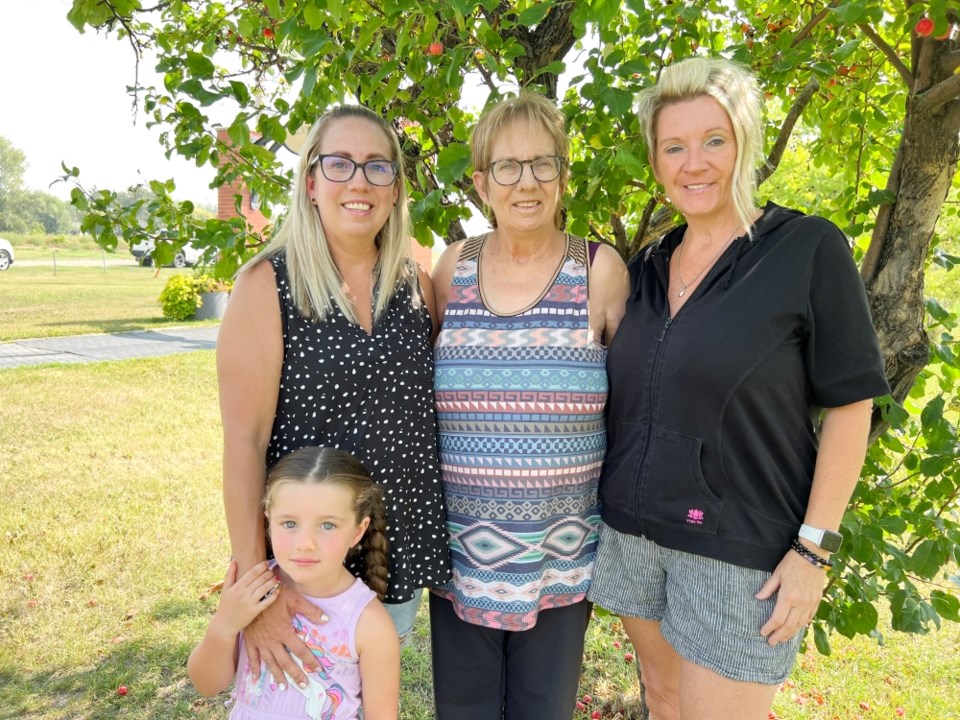SOUTHEAST SASKATCHEWAN - Cara McConnell was born and raised by her parents Gary and Heather McConnell on a PMU farm near Carlyle.
The farm housed 160 mares, stallions, foals and yearlings, with a barn holding 101 tie stalls for the mares where they collected the urine.
They also had a few Percherons that Gary would team up and offer sleigh rides in the winter while attending the odd parade.
The family has had a great deal of stress as a genetic kidney disease called polycystic runs in the family.
Heather’s mom had the disease, three of Heather’s five siblings had it, Heather has the disease and so does Cara.
There was a 50/50 chance of Cara being born with the illness, which leads to fluid cysts on the kidneys, causing the kidney to get larger and slowly stop working.
Cara now lives in Kamloops, B.C. and has two daughters. Grayce Kennedy is 15 years old, and she has been tested and does not have the disease, but Layne Crawford is only four years old and still needs the testing.
Cara knew at a young age she had the genetic disease, because she is an only child. Her parents could not bear to have more children with the chance of them all having the illness.
At some point in her life, she would need a kidney transplant, as hers would slowly break down.
In her 30s, her blood pressure began to elevate, and after each child her kidney would get worse.
Cara's kidney was at 10 per cent function; at seven per cent she would need dialysis, so her search began for a donor.
Her quest would begin with reaching out to family on social media, asking who had type O-positive blood, and this is when her cousin Tara Bryant replied, “I have O positive".
Bryant had earlier found out what blood type she was.
“I just needed to know my blood type and now I know why," said Bryant, who lives in White Bear and did not hesitate when her cousin asked her the big question.
She needed a kidney, and Bryant jumped right in to save her cousin's life.
Many tests are needed, such as blood work, chest x-rays, CT scans and more, as a donor needs to be in good health and Bryant was.
Now the pairing of their blood would be needed to see if Cara would accept it, and it was devastating to learn that her body rejected Bryant’s blood, so the match would not work.
Bryant already had the support of her partner Ray and two children Hannah and Halen to go ahead with the living kidney, and so she went ahead with being a donor, but this time her kidney would go to a stranger. This would ensure that her cousin would receive the much-needed kidney from another stranger.
In April and May 2023, the surgeries took place in B.C. The operations took about four hours, a short stay in the hospital, and a four-to-six week recovery time. Today both women are doing well. Cara's kidney, once at 10 per cent, is now at 64 per cent and climbing.
A person's body can easily live with one kidney, but if Bryant ever would run into trouble with her one kidney, she is moved to the top of the list, because she was so selfless and helped someone else.
She is forever grateful to Tara for giving her life, and her Aunt Velda and Uncle Brent Peach for all their help after the surgery. To her friends and the village, she lives in, thank you for your emotional, mental and financial support.
“It will never be forgotten,” said Cara, who believes she has so many people to thank.
The two have another quest and this one is very urgent. Cara's mother Heather is in desperate need of a kidney as well.
Heather has been on dialysis for 17 years. The first seven years she was able to do peritoneal dialysis. This was done at home during the night for nine hours, allowing Heather to work from home. A clear solution was used, but after awhile this no longer worked.
For the past 10 years, on Monday, Wednesday and Friday, Heather is driven to St. Joseph's Hospital in Estevan by Gary or a friend to have her life-saving dialysis. The drive is an hour, the procedure is four hours and then another hour drive home. By the end, Heather is exhausted.
Cara came back to Carlyle to heal and also to help with the drives to the hospital and to give her father a break.
When Heather was 57, she also suffered a stroke, leaving her unable to speak. Now only 66 years old, she still has hope for a kidney.
Family did try to help, as three members stepped forward to donate. Out of the three, one would work and when she began the final testing, she found out she had cancer.
Without a kidney transplant, Heather's future is not bright.
A person does not need to match Heather’s blood. It is called a pairing group. A person donates their living kidney to a stranger, stating they wish to help Heather. This will ensure Heather gets the kidney she needs so badly, and two people’s lives are saved.
According to Bryant, it is easy to access the donor site at blood.ca. The site is simple to go through and answers many of the questions and there is also a program that helps with expenses while going through the procedure.
Amid the testing and finally the surgery, a person is given a support nurse and counsellor. They check up on the person regularly and answer any questions that might need answering.
Bryant and Cara will always remain close, due to their experience and now a life-long bond.


